
Credit: Entertainment Weekly
“You are an evolutionary necessity.”
With the second series of Killing Eve starting this month, and one of our most eagerly anticipated TV shows of the year, it seems a good point to take a look back at Luke Jennings’s original source material, and its translation to the small screen. Codename: Villanelle was originally self-published by Jennings as four separate novellas, the first (with the same name) appearing in February 2014. It was followed by Villanelle: Hollowpoint in August, then Villanelle: Shanghai and Odessa in February and June of the following year.
It wasn’t Jennings’s first published work: far from it, with Atlantic appearing back in 1995. These were mostly what Jennings calls “politely received but unprofitable novels,” adding “Our income was, to say the least, patchy.” That probably explains why he was dance critic at The Observer newspaper for 14 years. Which in turn explains the entry in his bibliography which stands out as most un-Villanelle like: his co-authorship of The Faber Pocket Guide to Ballet…
Codename: Villanelle was optioned for the screen relatively quickly after the first novella, in spring 2014. Initially pitched to Sky Living, they turned the project down, but it was reworked by writer Phoebe Waller-Bridge, to put more emphasis on Eve, and these modifications also triggered the title change. It was a wise decision, I think. Codename: Villanelle seems very passive, a label given to a character (and half-meaningless unless you’re an expert on French perfume). Killing Eve is considerably more active, and also reflects the shift in focus from the hunter to the hunted. It helped get the show picked up by BBC America, and in autumn 2016, the show was given the go-ahead for an eight episode first series. But such was the advance buzz, that a second series was commissioned before even the first episode was broadcast.
This proved to be a wise decision. For it became a word-of-mouth hit, with ratings increasing by two-thirds from the first episode to the last. Critical reaction was no less enthusiastic: Killing Eve was included in more TV writers’ top tens for 2018, than any other show. Sandra Oh’s performance as Eve was particularly lauded, and she won the Golden Globe, Screen Actors’ Guild and Critics’ Choice Television Awards for her portrayal. The success of the series helped propel the first book onto the best-seller lists, and allowed Jennings to quit his day job at The Observer. The second volume, No Tomorrow, was published in October; we’ll have a review of that up later in the week.
But for now, we’re concentrating on the first book – and in particular, comparing and contrasting the show with its source material. What are the similarities? And, perhaps more interestingly, what are the differences? [Of necessity, what follows include significant spoilers for both TV and literary incarnations]
 Villanelle
Villanelle
“They had recognized her talent, sought her out and taken her from the lowest place in the world to the highest, where she belonged. A predator, an instrument of evolution, one of that elite to whom no moral law applied. Inside her, this knowledge bloomed like a great dark rose, filling every cavity of her being.”
As noted above, the book leans considerably more towards Villanelle than the TV series in balancing the characters. In the show, she is initially a blank slate, and only slowly is her background revealed, as Eve peels back the layers behind her fake persona. The novel, however, fills in the basic details by page 13, while Eve doesn’t even appear until almost a quarter of the way in. Villanelle is a convicted triple-murderer, having taken revenge on the criminals responsible for killing her father – just one of a number of incidents that illustrate her socio/psychopathic nature [let’s not get bogged down in labels]. In the TV series, it’s a less family-oriented crime which gets her put away: castrating and murdering the husband of a teacher/lover.
She is then spirited out of prison by a shadowy group, known as “The Twelve” and trained in a range of lethal arts, becoming an assassin employed by them. “Shadowy” is putting it mildly for the TV version. Entirely opaque is probably closer to the truth, since we know almost nothing about them. The novel, in contrast, opens with a depiction of their meeting, and The Twelve deciding to unleash Villanelle on a target. We still don’t know who they are or their goals, however. They clearly don’t mess around though. While Konstantin, Villanelle’s handler, is in an “is he dead or not?” limbo at the end of season one, there’s no such doubt in the book. He’s 100% dead, killed by Villanelle after he has been rescued by her from kidnapping – just in case he divulged any incriminating information. Guess you never know. That’s considerably more brutal than in the show, where Konstantin does indeed “go rogue”.
The Vilannelle we see is considerably more anti-social than in the book, where she is entirely capable of hanging out with people as and when necessary. The version on the page is considerably more sexual too – likely impacted by the TV show being on basic cable – with a habit, after completing an assassination, of finding some random stranger – male or female, she’s not bothered – for a meaningless fling. For her, it’s all about making them want her, and the resulting power she has over them. [There’s also a rather gratuitous scene, describing in unnecessary detail the unpleasant sexual fetish of one victim]
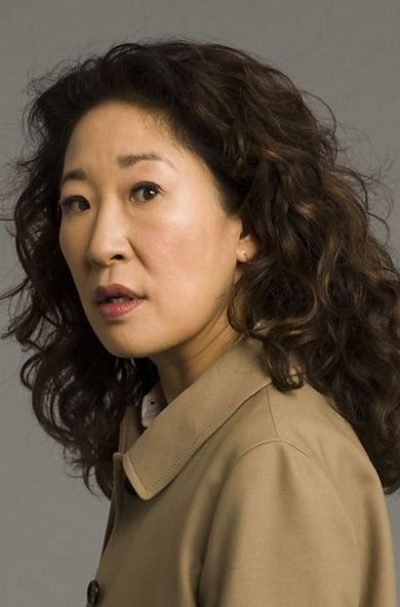 Eve Polastri
Eve Polastri
“Eve Polastri is looking down at Lambeth Bridge and the wind-blurred surface of the river. It’s 4 p.m. and she has just learned, with mixed feelings, that she is not pregnant.”
Even on the most superficial level, the small-screen version of Eve is radically different. In the book, she’s British and aged 29. The change in nationality was something BBC America required. Given their audience, it’s somewhat understandable, despite the resulting, somewhat clumsy need to explain why a Yankee is working for the British security services. That Sandra Oh is two decades older than the original Eve diminishes the suggestion in the novel that Eve and Villanelle are two sides of the same coin. Both are professional, childless women who have turned to their work, to the exclusion of almost everything else. Instead, the generation gap creates other echoes, almost a mother/delinquent daughter relationship.
Despite her youth, book Polastri has risen to become the head of her department at MI-5, which arranges special protection for visitors to the UK who are deemed at risk. She’s already intrigued by the whispers of Villanelle she has found, but this becomes a full obsession after the assassin takes out a Russian fringe politician on Eve’s turf, causing the civil servant to lose her position. Both versions then have Eve being recruited for an off-book operation to hunt Villanelle down, cutting ties with her previous colleagues.
This brings tension to Eve’s marriage with Niko, though much more so on television. In the book, while they still have their disagreements when Eve puts work before previously-arranged social engagements, there is a reconciliation (of sorts) towards the end. Niko and his academic pals help Eve crack a USB password, the device containing information that leads to an operative associated with The Twelve inside MI-5. Their marriage is certainly in a far better place at the end of volume one, than series one.
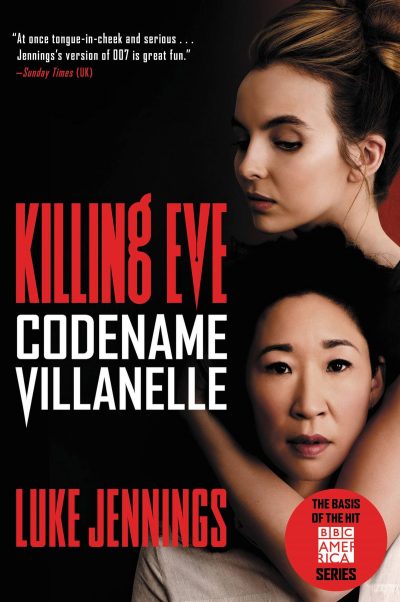 Eve vs. Villanelle
Eve vs. Villanelle
“She knows who I am. Killing Simon was a message, addressed to me. She was saying I can take you, and the people you care about, any fucking time I want…”
It’s at the nexus of the two main characters, in their relationship, that the TV series and book diverge most drastically. Because, in the novel, there pretty much isn’t one. Eve and Villanelle have virtually no conscious interaction at all. Emphasis on conscious, since the most time they spend together is when the killer slips into the spy’s Shanghai hotel room while Eve is sleeping and “inhales her warm smell.” What there is, is strictly adversarial: Eve regards Villanelle solely as a threat who must be stopped. “It’s just beginning,” are the three words from Eve with which the first book ends, as she puts a Glock 19 pistol in her bag. There’s little doubting her intentions.
What Phoebe Waller-Smith did in the show, was broaden and deepen that relationship, in a myriad of ways, both little and big. It feels more like Clarice Sterling and Hannibal Lecter in Silence of the Lambs, with a charming psychopath playing games against a dogged, somewhat dour bloodhound. By deepening the discord between Eve + Niko, and her overall discontent with life, and playing up Villanelle’s bisexuality, the TV show has added a slab of unresolved sexual tension between the pair, which simply wasn’t present in the first book. It has certainly helped make the show become a firm favourite in the gay community, though thanks to the wonderful performances of Oh and Jodie Comer, it’s far more than ghetto TV.
I do have concerns, however. In a Reddit AMA, Jennings said, “The fandom drives the success of the books and the show, and also influences it. Killing Eve: No Tomorrow would be a different book if I hadn’t spent time listening to fans.” It seems a perilous route for any creative person, to let the consumers dictate where your story goes. I’ve already seen Xena: Warrior Princess destroyed when its makers started pandering to the demands of gay fan ‘shippers. Will Killing Eve go the same way? We can only hope it doesn’t.
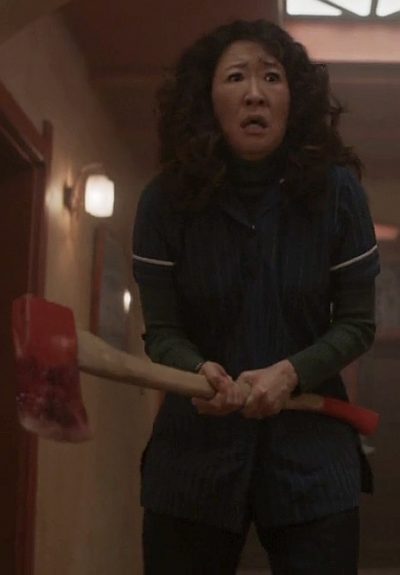 [Warning: this piece will contain significant spoilers for the show. READ ON AT YOUR OWN RISK!] It was always going to be difficult, if not impossible, for the second series of Killing Eve to match the brilliance of the first. That had ended with mousy MI-5 desk jockey Eve (Oh) stabbing ruthless assassin Villanelle (Connor), as they lay on a bed – platonically, but you could cut the sexual tension with a knife. Where would things go from there? The answer, unfortunately, is nowhere particularly much, except for some thoroughly unconvincing plot twists, such as Villanelle going to work for MI-5. Hello? Did everyone forget her cold-blooded murders of agents Bill Pargrave and Frank Haleton in season one? Let’s just pretend she’s one of us, and send her off on a mission without so much as a background check, m’kay?
[Warning: this piece will contain significant spoilers for the show. READ ON AT YOUR OWN RISK!] It was always going to be difficult, if not impossible, for the second series of Killing Eve to match the brilliance of the first. That had ended with mousy MI-5 desk jockey Eve (Oh) stabbing ruthless assassin Villanelle (Connor), as they lay on a bed – platonically, but you could cut the sexual tension with a knife. Where would things go from there? The answer, unfortunately, is nowhere particularly much, except for some thoroughly unconvincing plot twists, such as Villanelle going to work for MI-5. Hello? Did everyone forget her cold-blooded murders of agents Bill Pargrave and Frank Haleton in season one? Let’s just pretend she’s one of us, and send her off on a mission without so much as a background check, m’kay?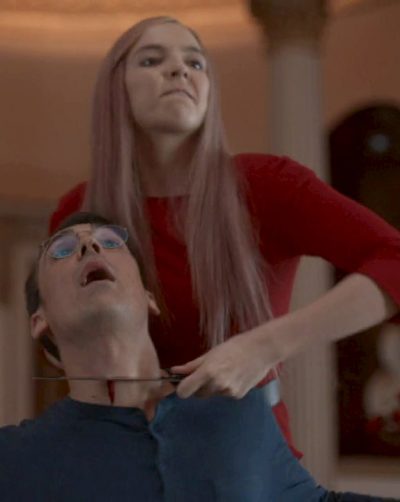 After becoming an under-the-radar hit the first time, the second set of episodes seems to have left a lot of people unsatisfied, for a variety of reason. And the ratings reflect this. Having managed the almost unprecedented feat of increasing almost every week the first time round, this season saw fewer viewers for every part after the debut, than the equivalent in series one. Maybe renewing it the day after that opening episode was a mistake? The final scene of this series ends in a mirror image of its predecessor, Villanelle shooting Eve in a fit of pique after she responds to Villanelle’s declaration of love with “You don’t know what that is,” and walks away. Of course, the renewal and critical acclaim basically make it certain Eve isn’t dead. So it’s less a case of “What will happen?”, than “What cheat will the writers use to get out of the corner into which they’ve painted themselves?” I’m going with a bullet-proof vest.
After becoming an under-the-radar hit the first time, the second set of episodes seems to have left a lot of people unsatisfied, for a variety of reason. And the ratings reflect this. Having managed the almost unprecedented feat of increasing almost every week the first time round, this season saw fewer viewers for every part after the debut, than the equivalent in series one. Maybe renewing it the day after that opening episode was a mistake? The final scene of this series ends in a mirror image of its predecessor, Villanelle shooting Eve in a fit of pique after she responds to Villanelle’s declaration of love with “You don’t know what that is,” and walks away. Of course, the renewal and critical acclaim basically make it certain Eve isn’t dead. So it’s less a case of “What will happen?”, than “What cheat will the writers use to get out of the corner into which they’ve painted themselves?” I’m going with a bullet-proof vest.





 Villanelle
Villanelle Eve Polastri
Eve Polastri Eve vs. Villanelle
Eve vs. Villanelle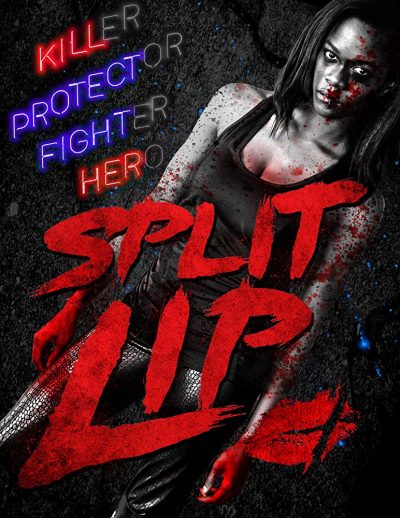 Definitely a mixed bag in this independent work about an assassin on the run from her employers after she botches a contract. Seay is thoroughly compelling as Set, proving that less can sometimes be more when it comes to dialogue. She’s a woman of few words, yet the strength of her emotions still comes through in her performance. I think it’s the eyes. Unfortunately, the makers appear not to have had enough confidence to let her silence stand on its own. Instead, they fill the gap with the inane burblings of Samuel (Laballe), a young man who sees Seay, and decides she’s a battered woman in need of rescue. He quickly discovers that isn’t the case, as she ends up rescuing him from one of the killers sent on her trail. However, his sister Dana (Cné) is unimpressed with her brother’s new friend, and turns Set in to her boss, Karlton (Brown).
Definitely a mixed bag in this independent work about an assassin on the run from her employers after she botches a contract. Seay is thoroughly compelling as Set, proving that less can sometimes be more when it comes to dialogue. She’s a woman of few words, yet the strength of her emotions still comes through in her performance. I think it’s the eyes. Unfortunately, the makers appear not to have had enough confidence to let her silence stand on its own. Instead, they fill the gap with the inane burblings of Samuel (Laballe), a young man who sees Seay, and decides she’s a battered woman in need of rescue. He quickly discovers that isn’t the case, as she ends up rescuing him from one of the killers sent on her trail. However, his sister Dana (Cné) is unimpressed with her brother’s new friend, and turns Set in to her boss, Karlton (Brown).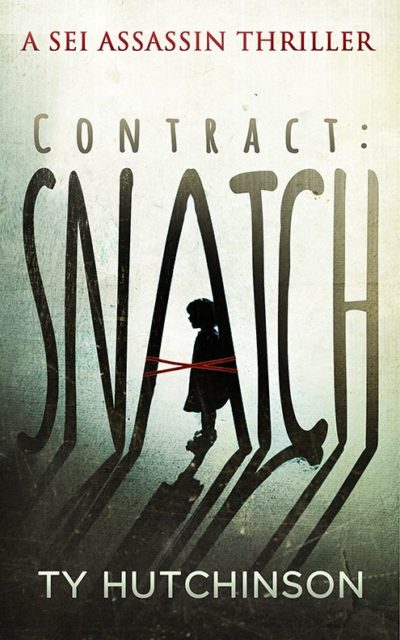 Sei is a former assassin, who quit the industry after getting pregnant, then having her daughter stillborn. She has taken up a quiet life in the Belgian countryside, when she’s brought out of retirement by a shocking offer she received over the deep web. Her prospective employer says Sei’s daughter is not dead, and offers information in exchange for carrying out a job: breaking another assassin, the notorious Black Wolf, out of the Turkish prison where he is being held. After confirming with the doctor who was present that the claim of her daughter’s survival is true, Sei accepts the mission. However, it turns out she was set up as a patsy, and finds herself also incarcerated in conditions which seem not have improved much since Midnight Express.
Sei is a former assassin, who quit the industry after getting pregnant, then having her daughter stillborn. She has taken up a quiet life in the Belgian countryside, when she’s brought out of retirement by a shocking offer she received over the deep web. Her prospective employer says Sei’s daughter is not dead, and offers information in exchange for carrying out a job: breaking another assassin, the notorious Black Wolf, out of the Turkish prison where he is being held. After confirming with the doctor who was present that the claim of her daughter’s survival is true, Sei accepts the mission. However, it turns out she was set up as a patsy, and finds herself also incarcerated in conditions which seem not have improved much since Midnight Express.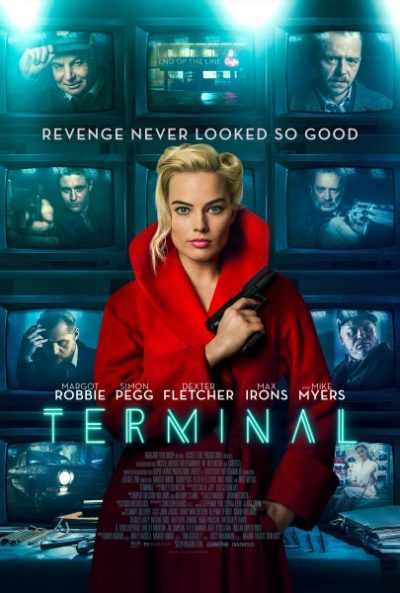 Oozing with a unique visual style that’s like a brutalist cross between Blade Runner and Alice in Wonderland, this focuses on a battle for business between assassins. Annie (Robbie) – or, maybe, she’s called Bonnie – wants to take over the murderous commissions of the mysterious Mr. Franklin. He agrees, only if she takes out the current incumbents, Vince (Fletcher) and his apprentice, Alfred (Irons). Simultaneously, while working as a waitress in an all-night diner at a railway station, she meets Bill (Pegg), a terminally-ill English teacher, who enters her establishment while waiting for a train in front of which to throw himself.
Oozing with a unique visual style that’s like a brutalist cross between Blade Runner and Alice in Wonderland, this focuses on a battle for business between assassins. Annie (Robbie) – or, maybe, she’s called Bonnie – wants to take over the murderous commissions of the mysterious Mr. Franklin. He agrees, only if she takes out the current incumbents, Vince (Fletcher) and his apprentice, Alfred (Irons). Simultaneously, while working as a waitress in an all-night diner at a railway station, she meets Bill (Pegg), a terminally-ill English teacher, who enters her establishment while waiting for a train in front of which to throw himself. ★★★★
★★★★ A genuinely organic hit on BBC America, this generated so much word of mouth that the ratings for this show behaved in an unexpected fashion. Including those who DVR’d the show, viewership increased for each episode over its 8-week run. That’s a rare feat these days, and is testament to the show’s unique qualities. So confident were the station in the show, that is was renewed for a second season before it had even premiered – another unusual achievement. But then, this show is arguably unlike anything else on television.
A genuinely organic hit on BBC America, this generated so much word of mouth that the ratings for this show behaved in an unexpected fashion. Including those who DVR’d the show, viewership increased for each episode over its 8-week run. That’s a rare feat these days, and is testament to the show’s unique qualities. So confident were the station in the show, that is was renewed for a second season before it had even premiered – another unusual achievement. But then, this show is arguably unlike anything else on television.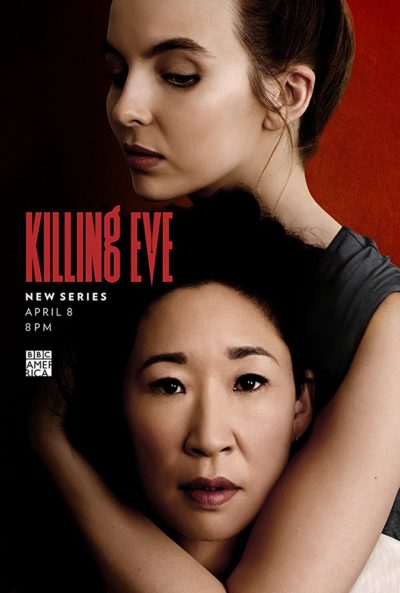 The show is defiantly messy in terms of its characters, who manage both to embody the stereotypes of the dogged law-enforcement official and the slick, femme fatale, while also subverting them. From the viewpoint of this site, Oksana is likely the more interesting. As a high concept, imagine a female version of Dexter: charming and affable on the surface, yet extraordinary lethal – and capable of flicking that switch in a moment. The difference is, Villanelle has chosen not to control and direct her “dark passenger” so much as embrace them fully, and is given the chance to do so by the profession into which she is recruited. It also allows her to indulge her fondness for haute couture.
The show is defiantly messy in terms of its characters, who manage both to embody the stereotypes of the dogged law-enforcement official and the slick, femme fatale, while also subverting them. From the viewpoint of this site, Oksana is likely the more interesting. As a high concept, imagine a female version of Dexter: charming and affable on the surface, yet extraordinary lethal – and capable of flicking that switch in a moment. The difference is, Villanelle has chosen not to control and direct her “dark passenger” so much as embrace them fully, and is given the chance to do so by the profession into which she is recruited. It also allows her to indulge her fondness for haute couture.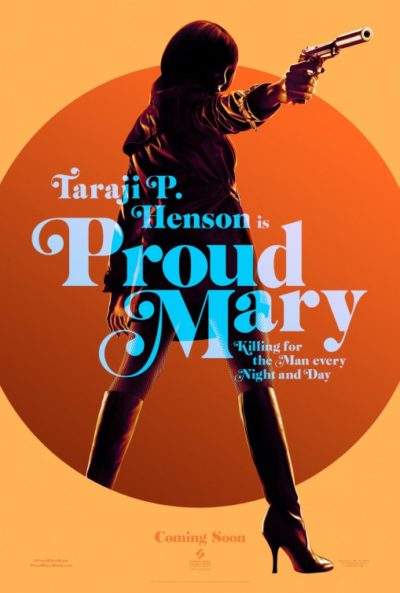 Despite the distinctly retro feel of the poster, intro and much of the music, this is very much a contemporary affair. Mary (Henson) is an enforcer working for Benny (Glover): at one point, she was in a relationship with his son, Tom (Brown), and he still wants to continue it. During one hit on a debtor, she finds the target’s young son, Danny (Winston), obliviously playing video-games in his bedroom. Struck by guilt, she leaves him alone, and keeps an eye on the kid thereafter. A year later, she rescues him from the abusive drug dealer who has “adopted” Danny, but the resulting bloodbath is a big problem. For the dealer in question worked for Benny’s biggest rival, who is not happy about the removal and demands Benny find the culprit. Mary, who was already fed up and wanting out of her career, has to decide exactly where her loyalties lie.
Despite the distinctly retro feel of the poster, intro and much of the music, this is very much a contemporary affair. Mary (Henson) is an enforcer working for Benny (Glover): at one point, she was in a relationship with his son, Tom (Brown), and he still wants to continue it. During one hit on a debtor, she finds the target’s young son, Danny (Winston), obliviously playing video-games in his bedroom. Struck by guilt, she leaves him alone, and keeps an eye on the kid thereafter. A year later, she rescues him from the abusive drug dealer who has “adopted” Danny, but the resulting bloodbath is a big problem. For the dealer in question worked for Benny’s biggest rival, who is not happy about the removal and demands Benny find the culprit. Mary, who was already fed up and wanting out of her career, has to decide exactly where her loyalties lie.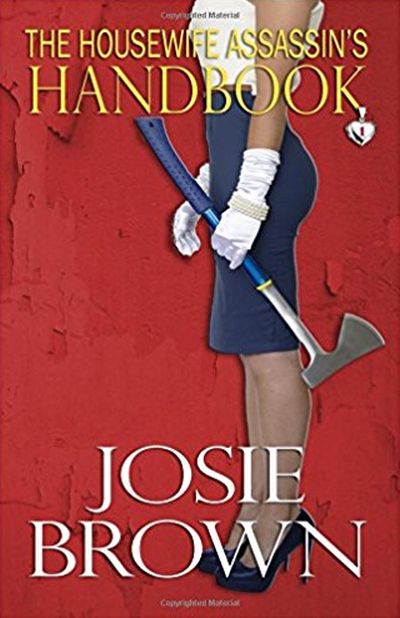 My preferred format for reading is paper; and that’s the only format I support financially, since the only language Big Publishing understands is dollars and cents. Even for a reader like myself, though, e-books have their uses. Writers can offer particular books for free in that format, and that makes it possible to read them first in order to check the quality before you buy the paper edition. And sometimes that opportunity saves you money that would have been wasted if you’d taken a chance on the paper book to begin with! For me, this series opener (which Brown makes available free in e-book format on a permanent basis) was one of those books I was thankful I didn’t have to spend money on, which I’d have regretted.
My preferred format for reading is paper; and that’s the only format I support financially, since the only language Big Publishing understands is dollars and cents. Even for a reader like myself, though, e-books have their uses. Writers can offer particular books for free in that format, and that makes it possible to read them first in order to check the quality before you buy the paper edition. And sometimes that opportunity saves you money that would have been wasted if you’d taken a chance on the paper book to begin with! For me, this series opener (which Brown makes available free in e-book format on a permanent basis) was one of those books I was thankful I didn’t have to spend money on, which I’d have regretted.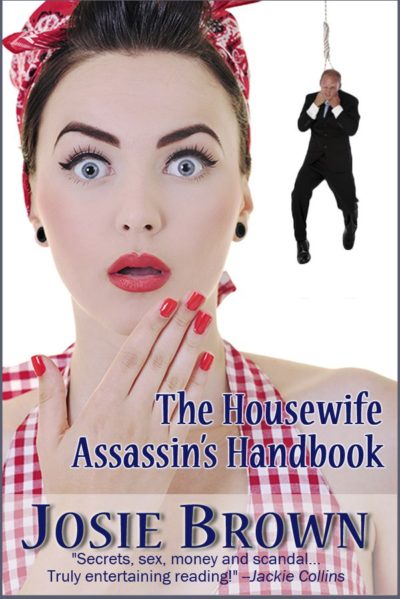 The principal problem I had here was that the plotting is simply not well thought out, and not convincing. One could argue that the essential premise is far-fetched; but I was okay with suspending disbelief that far. (Whether or not black ops organizations would hire a single mom with kids is a matter of speculation, since real life organizations like this don’t publicize their personnel policies. :-) ) But even within the premise Brown creates, much of her plotting simply doesn’t stand examination. Some of the major actions by the villain(s) are at cross-purposes with some of their other major actions; several events that take place here would involve the police in the story, at a level that couldn’t be ignored, but there’s no indication of that here; Donna’s reasoning for one major decision is weak and unconvincing; and Acme (the company she works for) would be much more actively involved in the decision-making at the end, not passive as it is here. Also, characters could not realistically suddenly just shrug off previously incapacitating wounds (which happens here twice), and there are other significant logical slips that took me out of the story. The author writes prolifically, but she apparently wrote this novel too quickly to take her craftsmanship in plotting seriously, or to put any real thought behind it. (That’s a real shame.)
The principal problem I had here was that the plotting is simply not well thought out, and not convincing. One could argue that the essential premise is far-fetched; but I was okay with suspending disbelief that far. (Whether or not black ops organizations would hire a single mom with kids is a matter of speculation, since real life organizations like this don’t publicize their personnel policies. :-) ) But even within the premise Brown creates, much of her plotting simply doesn’t stand examination. Some of the major actions by the villain(s) are at cross-purposes with some of their other major actions; several events that take place here would involve the police in the story, at a level that couldn’t be ignored, but there’s no indication of that here; Donna’s reasoning for one major decision is weak and unconvincing; and Acme (the company she works for) would be much more actively involved in the decision-making at the end, not passive as it is here. Also, characters could not realistically suddenly just shrug off previously incapacitating wounds (which happens here twice), and there are other significant logical slips that took me out of the story. The author writes prolifically, but she apparently wrote this novel too quickly to take her craftsmanship in plotting seriously, or to put any real thought behind it. (That’s a real shame.)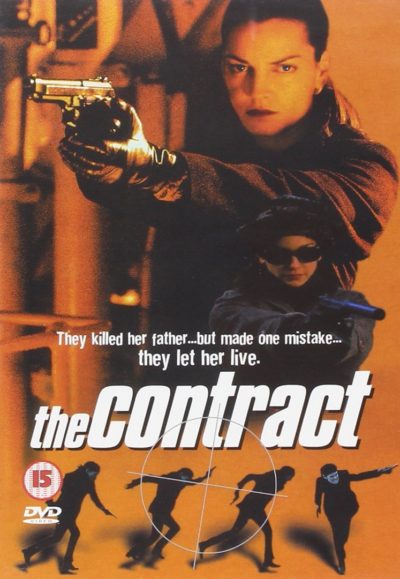 I bumped into this one on a stand of ultra-bargain DVDs, at a truck stop on the way home with Chris from an anniversary trip to Las Vegas. The cover, understandably, piqued my interest: the film didn’t manage to make such an impression, except in intermittent bursts. Hannah (Black) is an assassin, working under the tutelage of her father, Luc (Imbault). He spurns a lucrative contract, smelling a rat: Hannah goes behind his back and takes the job, only for Dad to be proven right, when the hit goes wrong. Luc is killed, leaving Hannah and her oblivious artist boyfriend James (Oliver) on the run from Senator Harmon (Williams). He’s a CIA honcho, who has just announced his plans to run for higher office, and needs to clean up certain elements of his past – now including Hannah and James.
I bumped into this one on a stand of ultra-bargain DVDs, at a truck stop on the way home with Chris from an anniversary trip to Las Vegas. The cover, understandably, piqued my interest: the film didn’t manage to make such an impression, except in intermittent bursts. Hannah (Black) is an assassin, working under the tutelage of her father, Luc (Imbault). He spurns a lucrative contract, smelling a rat: Hannah goes behind his back and takes the job, only for Dad to be proven right, when the hit goes wrong. Luc is killed, leaving Hannah and her oblivious artist boyfriend James (Oliver) on the run from Senator Harmon (Williams). He’s a CIA honcho, who has just announced his plans to run for higher office, and needs to clean up certain elements of his past – now including Hannah and James.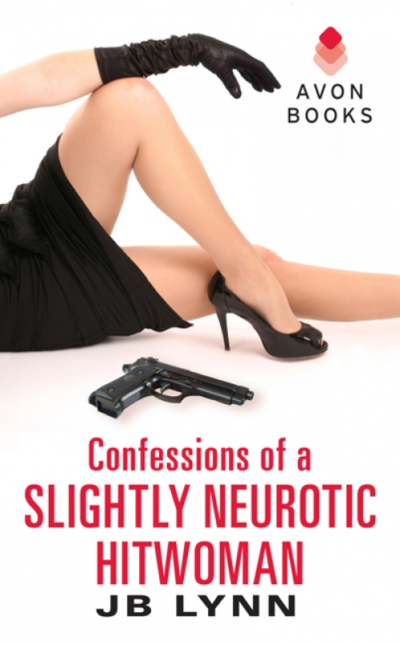 I guess there is at least something logical about this, in how its heroine, Maggie Lee, becomes the assassin of the title. She takes on her first contract to pay the medical bills of her niece, left in a coma after a car accident which killed her parents and injured Maggie. That’s the kind of motivation which I can see, causing a person to take desperate steps. Unfortunately, it’s a rare island in a sea of largely implausible plotting and uninteresting characters.
I guess there is at least something logical about this, in how its heroine, Maggie Lee, becomes the assassin of the title. She takes on her first contract to pay the medical bills of her niece, left in a coma after a car accident which killed her parents and injured Maggie. That’s the kind of motivation which I can see, causing a person to take desperate steps. Unfortunately, it’s a rare island in a sea of largely implausible plotting and uninteresting characters.